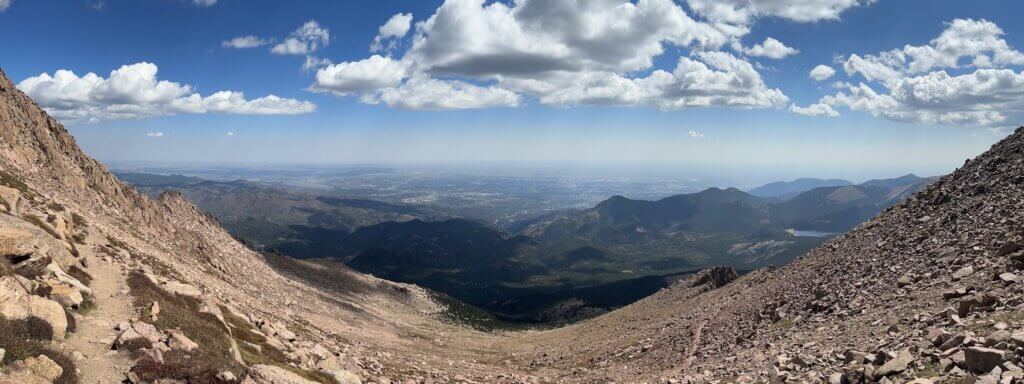
A few weeks ago, my spouse and I hiked part of Pikes Peak, which is 14,115 feet high. Some hikers started at the bottom and ascended all the way to the top, while others started mid-way and trekked the upper part of the mountain. We drove to the summit (a harrowing ride!), hiked a few miles downhill, and then climbed back up.
While visiting this majestic landmark, I noticed that most travelers seemed quite focused on their destination, generally the summit. I thought about how often we do that in life; we focus on the ultimate target—generally the highest point—without enjoying the journey, pausing to learn the many lessons available along the way, attending to ourselves or our fellow travelers, or even recognizing what we truly want as a destination (that last item is a post for another day).
During the initial ascent via car, as my spouse slowly navigated the narrow switchbacks, I was terrified of falling off the mountain. While I must admit that I considered closing my eyes, I was also captivated by the awesome views at each turn and didn’t want to miss a single moment. How often do we fixate only on one goal and close our eyes and our minds to what and who surrounds us? How much more might we appreciate our experiences if we allowed ourselves to find the wonder in each day?
As we hiked, we found small animal tracks and scat and wondered what animal left those signs. We then saw a few marmots and watched them scurry over the rocks. How often do we ignore possible clues or alternate options along the way? How much more could we learn if we explored our environment, and gathered relevant information and feedback from those around us?
After a while, we felt tired and hungry, so we took a break—to drink water, have a snack, and sit for a few minutes. How often do we forget to take bio and rest breaks during stressful work days? How much more might we improve our work and our well-being if we
practiced simple acts of self-care?
When we weren’t sure of the path, we asked for directions from passersby, who seemed happy to show us the way. How often do we decline to seek help for fear that others may judge us or assume lack of competency? How much farther could we travel if we acknowledged our imperfections and learned from others?
On our way back up, when we saw someone trip and fall, we stopped to offer assistance and only resumed hiking after we were sure they would be able to continue on their journey. How often do we decline to lift others up or to check on peers in case they might slow us down? How much more could we accomplish if we worked together and walked beside our colleagues?
How often do we focus only on that ultimate goal and thus miss significant and critical parts of the journey?
Let’s pause to enjoy the unparalleled beauty around us. Let’s open our eyes and our minds to others who are also on the journey. Let’s pay attention to the signs and surprise gifts that are left for us (yes, even marmot scat)! Let’s care for ourselves. Let’s help others who falter or fall; let’s offer assistance and then provide the support they need. Let’s recognize that the journey is as important—and perhaps at times even more precious—than the actual destination.

